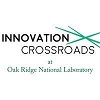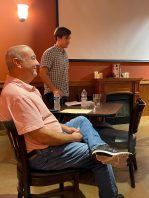
First “Innovation Crossroads Founders’ Forum” featured a program alum and serial entrepreneur
 By Tom Ballard, Chief Alliance Officer, PYA
By Tom Ballard, Chief Alliance Officer, PYA
The inaugural “Innovation Crossroads Founders’ Forum” featured an alum of the first cohort of the program, managed by Oak Ridge National Laboratory (ORNL), and a serial entrepreneur in the region who is now working on at least his fifth start-up.
Held Thursday afternoon at the Casual Pint in Hardin Valley, the event featured Mitch Ishmael, Co-Founder and Chief Technology Officer (CTO) of Active Energy Systems, and Bill Malkes, Chief Executive Officer (CEO) of NellOne Therapeutics Inc. Prior to joining the team at the biotech start-up, Malkes co-founded several companies with Vig Sherrill, the last being GRIDSMART Technologies Inc., which was acquired for $87 million at the end of 2018 (see teknovation.biz article here).
One of the panelists had seen a lot in his years of being an entrepreneur, while the other was deep into growing his first venture. Yet, each had important lessons that they shared with the recently arrived members of the sixth cohort of “Innovation Crossroads” (IC) as well as others who attended the forum.
 Ishmael (pictured here standing with Malkes seated) started by emphasizing the importance of finding a co-founder. In the case of Active Energy, that person is Levon Atoyan who serves as the start-up’s CEO. A little more than five years into the journey, Ishmael told the attendees that the company made a major technology pivot several years ago, describing how he had to work hard to convince his co-founder that it was the right move.
Ishmael (pictured here standing with Malkes seated) started by emphasizing the importance of finding a co-founder. In the case of Active Energy, that person is Levon Atoyan who serves as the start-up’s CEO. A little more than five years into the journey, Ishmael told the attendees that the company made a major technology pivot several years ago, describing how he had to work hard to convince his co-founder that it was the right move.
Today, the company has exited the Fairview Technology Center, a business incubator near ORNL in the Solway Community, and has a 5,000 square foot facility in Oak Ridge with six employees. Also, as announced in April (see teknovation.biz article here), Active Energy met the initial conditions for a first close on a $1 million seed funding round, led by Boston-based Clean Energy Venture Group, with participation from Queen City Angels and Three Roots Capital.
Because he is the CTO, Ishmael said he entered the two-year IC program thinking he needed to spend the first year in the lab focused on technology before devoting time to customer discovery and fundraising. In fact, Ishmael admitted that the number of pitches that he made in the first year was somewhat frustrating.
“I came to realize that the connections made in that first year set us up for later funding,” he said, talking about the “deep relationships and trust” that proved valuable in the following years.
Another important tool was securing Small Business Innovation Research (SBIR) and Small Business Technology Transfer (STTR) grants from federal agencies. Active Energy has won two Phase I and Phase II awards from two agencies – the National Science Foundation and the Department of Energy (DOE) – for a combined $2.4 million. Those non-diluted funds have helped its technology focused on an advanced cooling solution with built-in energy storage to provide building owners with lower cooling costs, reduced carbon emissions, and strengthened cooling resiliency.
In relation to grant success, Ishmael cited the work that former DOE administrator Mark Johnson did to help them. About the company’s success in securing grants, he said it was because Active Energy had “a single problem to solve and (an explanation of) how that (solution) is going to open-up a new pathway.”
Malkes said that he had raised capital five times in his entrepreneurial journey and estimated that he had been told “no” at least 1,000 times. Yet, he kept coming back again and again.
“You are in a privileged position,” he told those in the room who are entrepreneurs. Why? “There are 35 million entrepreneurs in a world of eight billion people.” Noting that entrepreneurs are a fraction of the world’s population, he advised to “Lean into the good. Learn from the bad.”
Like Ishmael, Malkes stressed the importance of having a great partner for many reasons, not the least being someone with whom you can discuss business problems to avoid bringing them home where they become a concern for the family.
He reminded those in attendance that: (1) investors want a return; and (2) customers expect a product delivered regardless of supply chain issues like those that most business are experiencing to some degree right now.
One of the processes that Malkes said has worked well for him is a “pre-mortem.” That’s where you anticipate that something will go wrong and try to determine in advance what those things might be, how they might happen, and what you can do to prevent them.
“It’s a great way to better the company,” he said.
Like what you've read?
Forward to a friend!

